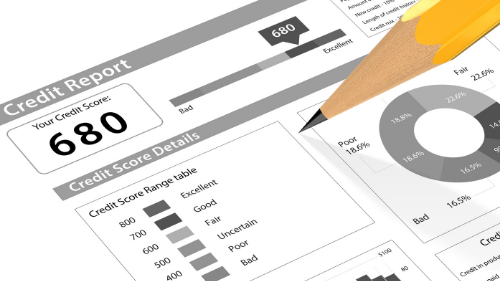If you’ve checked your credit score at Transunion and Equifax before, you might have noticed that the two credit reporting agencies gave you different numbers. You may have also asked yourself why is there a disparity in the two scores. Don’t worry, I have the same experience whenever I check my credit score at the different credit bureaus in Canada and in the United States. The first time I saw the difference in the scores, I immediately checked my credit report at each agency to see if one had a different credit history than the other, but they were practically the same. I waited for a few months to pass then I checked again but the scores were never the same. My conclusion after a series of checking and comparing — especially after checking in the U.S. where there is a third bureau, Experian — is that each reporting agency has a different formula to calculate our credit scores.
For this reason, people have different theories about how the credit bureaus arrive at their numbers. So while I cannot give you a specific formula since only the workers at the bureaus may know, I can explain how your credit score is impacted based on certain categories. And I will share what you should focus on to ensure you have a stellar score.
There are 5 key factors the credit bureaus use when calculating and determining your credit score:
- Payment History (This counts for 35%): Are your payments made late or on time?
- Total Amount Owed (This counts for 30%): Ideally, you want to keep your usage below 30%.
- Length of Credit History (This counts for 15%): How long did you have your loan or credit cards?
- New Credit Application (This counts for 10%): How many new loans or credit cards you received within the last 2 years?
- Types of Credit Used (This counts for 10%): Are they credit cards, mortgages, lines of credit, a car loan etc.?
Credit Score Calculation Pie Chart

Before I became financially literate, I was frequently told that having too much credit is not good. And I was encouraged to have only 1 or 2 credit cards and to object to any limit increases. What I wasn’t told is that if I have a credit card with a $10,000 limit for example, and I use it to make $7000 in purchases every month, even if I pay my bill in full each month, the bureaus still view my usage as 70%. But If I had a limit of $50,000 and use $7000 every month my usage would be only 14%. In both scenarios my usage is the same, but which one do you think would negatively impact my score?
If you’re not responsible with your credit cards then having only 1 or 2 credit cards, and a low credit limit is certainly advised. This will prevent you from going into unnecessary debt, and thus messing up your credit score. But if you are very responsible with your credit and you pay all your balance in full, having only one card can limit your opportunity to capitalize on the perks of credit cards, while at the same time potentially increasing your credit scores.
If you’re like me who put pretty much every purchase on my credit card to capitalize on reward points to obtain gift cards are plane tickets, having just one card doesn’t give you the flexibility to receive extended grace periods to pay off your balance in full on time. All your purchases would be due at one time and unless you save towards paying off your bill, you will more likely have to pay everything from the same paycheck. Having more cards can increase your credit limit, your payment frequency, and it will show creditors that you are more responsible with credit. This will positively impact your credit score. Plus you don’t have to pay for everything from one paycheck, you can spread your payments over multiple paychecks without having to pay your bills before the due dates.
It’s always a great idea to have a credit card for emergency situations. This way if an unexpected major expense such as replacing an air conditioner comes up, and you’re not able to cover that purchase in full by the time the bill is due, you can put that purchase on your emergency card. Doing that wouldn’t increase your percentage usage as much as if you had to put that purchase on the other cards you use regularly. Also, it wouldn’t affect the 0% grace period you enjoy on the other cards that you use regularly to make monthly purchases if you have to carry a balance from that unexpected expense for a little while.
Another category that can adversely affect your credit too, depending on the time frame, is previous public records such as: a prior history of bankruptcy, a credit proposal, prior collection issues, or any other derogatory public records. Some will impact your score longer than others. For example, if you filed for bankruptcy, this will stay on your credit for 7 years. So throughout those 7 years, it will continue to impact your score negatively.
Now that you know what is impacting your credit score, protect your score at all costs. Remember, the higher your credit score the more creditworthy you appear to lenders. And this gives you greater negotiating powers whenever you want a mortgage, a car loan, a line of credit, or any other personal loans.
[/et_pb_text][/et_pb_column][/et_pb_row][/et_pb_section]
